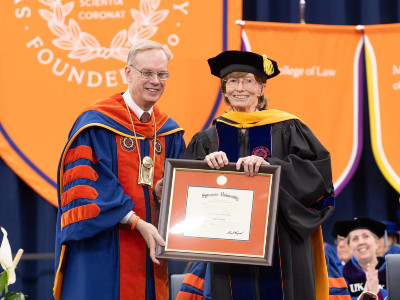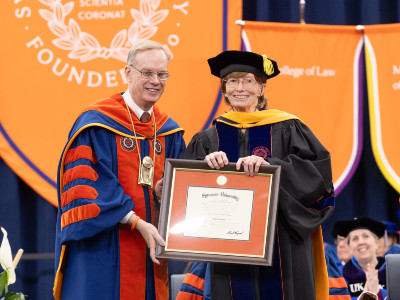University Remembers Silicon Chip Pioneer, Trans Activist Lynn Conway H’24
Lynn Conway H’24, a renowned computer scientist who received an honorary degree during the University’s Commencement in May, died June 9 in Michigan. She was 86.
Conway, who revolutionized global information technology by inventing methods for designing Very Large Scale Integrated (VLSI) silicon chips, was at Syracuse University on May 12 to receive an honorary doctor of science degree.

As a young engineer at IBM Research in the 1960s, Conway made pioneering innovations in computer architecture. IBM fired her in 1968 upon learning she was undergoing gender transition. She restarted her career in a new identity in “stealth-mode” after completing her transition.
While working at Xerox Palo Alto Research Center in the 1970s, Conway innovated breakthrough methods that enabled engineers to design very powerful, complex chips. In 1980, Conway’s seminal textbook “Introduction to VLSI Systems,” co-authored by Caltech Professor Carver Mead, became an instant classic, forever transforming computing and information technology. The late John V. Oldfield, then a professor of electrical and computer engineering in the College of Engineering and Computer Science (ECS), brought the new VLSI methods to Syracuse right at the beginning of that revolution.
In the early 1980s, Conway became assistant director for strategic computing at the Defense Advanced Research Projects Agency. In 1985 she joined the University of Michigan as professor of electrical engineering and computer science and associate dean of engineering.
When nearing retirement in 1999 she began quietly coming out as a trans woman, using her new website to share her story with friends and colleagues. Conway became active in transgender advocacy.
“Lynn made this world a better place in so many ways. Her work on VLSI revolutionized microelectronic education and manufacturing, and her advocacy for women and transgender people was courageous and important,” says ECS Dean Cole Smith. “She was a role model to many, and she helped to broaden the image of what an engineer or a computer scientist looks like. I am incredibly grateful that we had the chance to honor her at Syracuse University and recognize her for the tremendous impact she made.”
In 2012 Conway published a memoir that revealed how—closeted and hidden behind the scenes—she conceived the ideas and orchestrated the events that disruptively changed global industries.
Conway was a life fellow of the IEEE, fellow of the AAAS, winner of Computer Pioneer Award of the IEEE Computer Society, member of the Hall of Fellows of the Computer History Museum, a member of the National Academy of Engineering and held several honorary degrees. In 2023 she was inducted into the National Inventors Hall of Fame for the invention of VLSI. She was awarded the James Clerk Maxwell Medal by the IEEE and the Royal Society of Edinburgh.
In 2020, IBM CEO Arvind Krishna apologized on behalf of the company for IBM’s treatment of Conway back in 1968. She was also awarded the IBM Lifetime Achievement Award.



